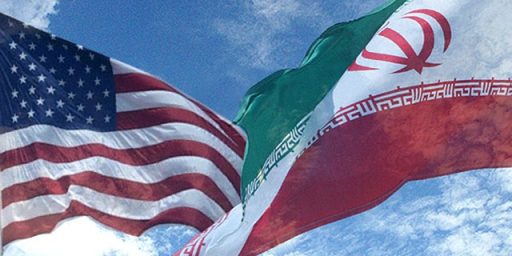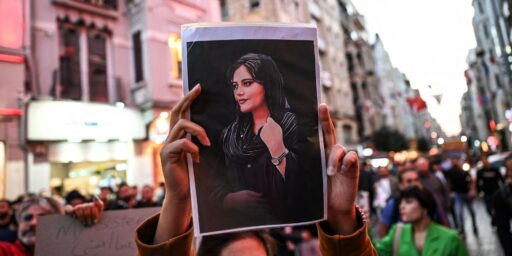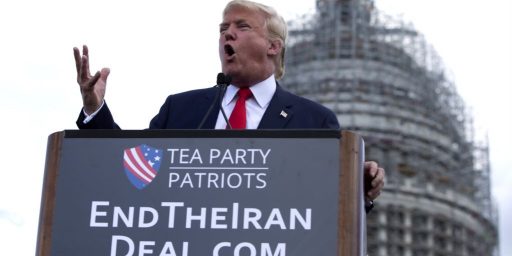Iranian Reformer Disqualified from Presidential Election
The Guardian Council builds on last year’s consolidation of power:
Leading Reformer Is Banned from Poll in Iran (FT)
Mostafa Moein, the main reformist candidate in next month’s Iranian presidential election, has been disqualified, increasing the odds of a conservative victory.
Iranian state television on Sunday night announced that the Guardian Council, the country’s Islamic watchdog, had accepted six candidates to contest the June 17 poll, including four who are considered hard-line conservatives.
The decision came before crisis talks due this week between Tehran and the European Union over Iran’s nuclear programme. Mostafa Tajzadeh, a senior official in Iran’s main reformist party Mosharekat, said last night Mr Moein’s exclusion meant the poll would be “unfree, a sham, an executive coupâ€. He told the Financial Times: “The election is illegal and we plan to have serious protests. We will not participate. The person who gets elected will not be a president, but rather someone who just enters the presidential palace.â€
Jahanbakhsh Khanjani, a spokesman for the interior minister, said the Guardian Council had “acted above the law†in announcing a “politically motivated†decision on television before either the ministry or candidates had been informed.
Iran ‘Bars Pro-Reform Candidates’ (BBC)
The Council vets all contestants for their moral values and support for the Islamic system of government.
Former president and poll favourite Akbar Hashemi Rafsanjani, four conservatives and a reformist make up the approved field of candidates.
The four hardliners are the former police chief, a former commander of revolutionary guards, the mayor of Tehran and the former head of state radio and television.
Iran’s former parliamentary speaker Mehdi Karrubi remains on the list, but correspondents say he had not been the reformists’ main contender.
Council Culls Presidential Hopefuls to Six (LAT)
The surprise announcement all but guarantees that a conservative will take over the presidency from moderate Mohammad Khatami, whose attempts at reform have been stifled in the increasingly hard-line political climate of recent years. Iran’s largest reform party decried the disqualifications and threatened to boycott the June 17 election unless the Guardian Council, which answers directly to Supreme Leader Ayatollah Ali Khamenei, reversed the decision.
The disqualifications follow a similar move by the Guardian Council before Iran’s parliamentary elections last year, when the panel barred more than 2,000 reformist candidates. Voter turnout plunged, hard-liners won control of the legislature and despair rose among Iranians seeking a more moderate government.
The effort to consolidate power in the hands of conservatives comes at a sensitive time for Iran’s leaders, who are entangled in negotiations with the West over the nation’s nuclear program. Iran says its program is to generate electricity, but the United States has accused Tehran of secretly working to build a bomb. At least one of the reformist candidates disqualified Sunday had urged Iran to make concessions in the talks.
[…]
“It’s clear they (Iranian conservatives) are not going to permit any presidential candidate of whom they don’t approve,” said Steven A. Cook of the Council on Foreign Relations. The political dialogue in Iran, he added, “is between conservatives and ultra-conservatives.”
This development, while unsurprising, further complicates the nuclear-weapons discussions. It’s hard enough to contain Iran’s ambitions, but when you add the disqualifications of potential reformists on top of that, its signal of defiance grows even louder.





I lived in Ahvaz, Iran in 1975-1976 and I can not help wondering when these people are going to say enough is enough. I really beleive they could pull off a Lebanon style coup if they times it right. But I also understand given the last 25 years.